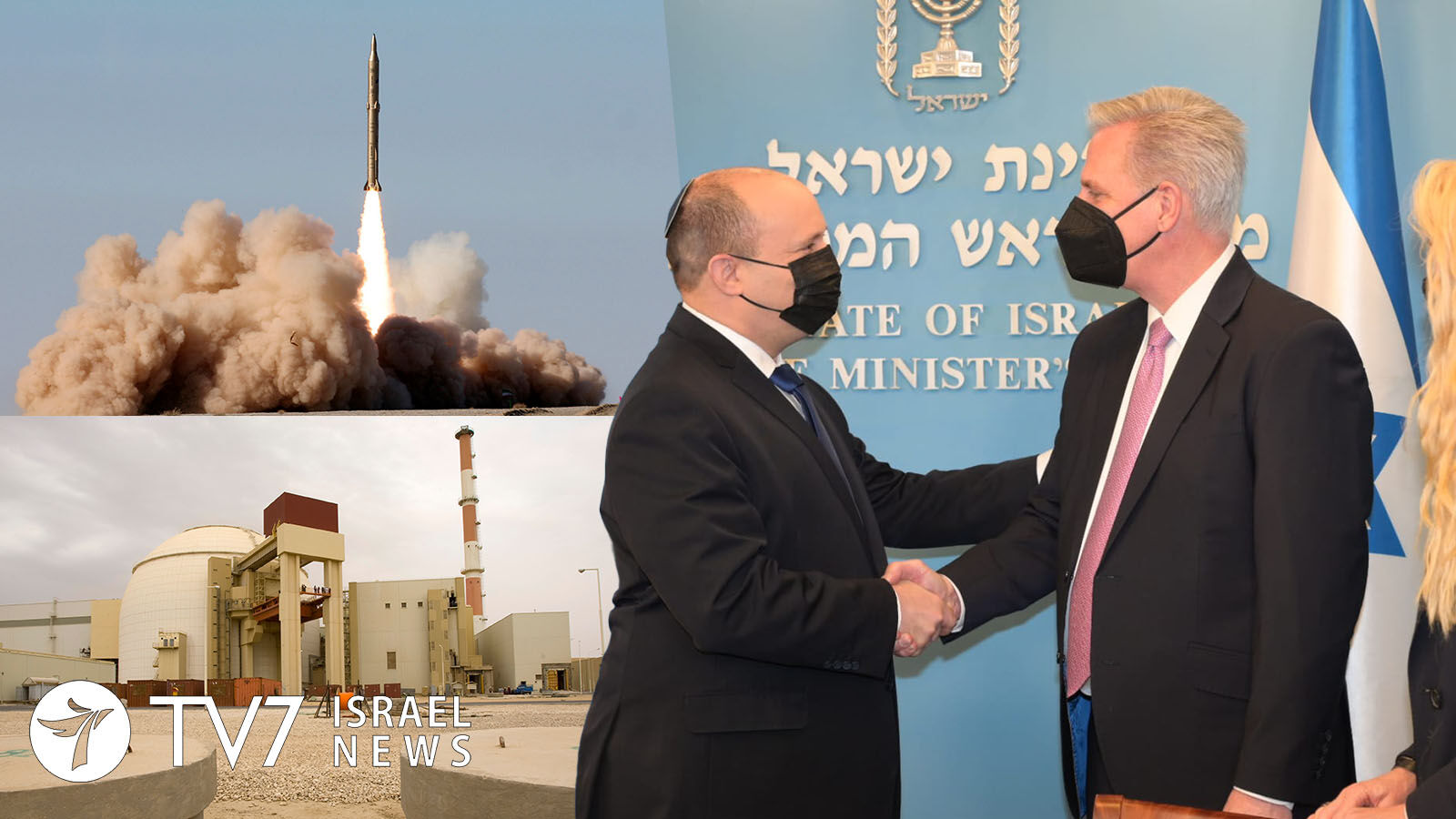The meetings in Jerusalem come as a deal to revive the Joint Plan of Action nuclear agreement between Iran and world powers appears to be imminent.
By Erin Viner
Israeli Prime Minister Naftali Bennett hosted 27 Republican members of the United States House of Representatives visiting the country as part of a delegation led by House Minority Leader Kevin McCarthy.
According to a statement from the Prime Minister’s Office, Bennett discussed the ongoing Vienna Talks with the American lawmakers, while thanking them “for their strong support of Israel.” He also underscored the importance of Jerusalem’s dialogue with “both sides of the political map” in Washington.
The visit by the Republican leaders overlaps with a trip by 14 Democratic members of Congress, in addition to a previous delegation that came to Israel last week led by House Speaker Nancy Pelosi.
Meanwhile Prime Minister Bennett said during an address to the Conference of Presidents of American Jewish Organizations that the new deal emerging at the Vienna Talks is weaker than the original arrangement and “highly likely to create a more violent, more volatile Middle East.”
While “there is no doubt that America is and will remain our biggest and strongest friend,” Bennett said, “ultimately, it is us who live in the region, and it is us here in Israel who will bear the consequences of the agreement.”
The most critical problem in the current negotiations, said the Israeli Premier, is consideration of a shorter timeline before Iran could freely operate advanced centrifuges if terms of the original deal are not extended.
The 2015 JCPOA had imposed restrictions on Iran’s nuclear program for one decade, which are expected to expire in 2025.
The “sunset clause” means in just 2 and a half years Iran will no longer be compelled to freeze development of uranium enrichment centrifuges, leaving it on “a fast track to military grade enrichment” without time to “even have to destroy the centrifuges they developed recently,” stressed Bennett.
As Bennett explained during an earlier meeting with his Cabinet, such an agreement would lead to “stadiums” of advanced centrifuges.
Other major points of Israeli contention, Bennett told the American Jewish leaders, include Iran’s demand on closing “essentially hot investigations pertaining to possible military dimensions” of its nuclear development program by the International Atomic Energy Agency (IAEA), the de-listing of the Islamic Revolutionary Guards Corps (IRGC) as a terrorist entity, and the release of “tens of billions of dollars into the Iranian terror apparatus” to be funneled to its proxies in Yemen, Iraq, Syria, Lebanon and Gaza for “more UAVs, more attacks on merchant ships, more attacks and more rockets on Israel.”
“It is our duty to provide security to our people while being a reliable ally to our friends,” Bennett underscored, before adding: Let me be clear, Israel will not accept Iran as a nuclear threshold state and we have a clear and unnegotiable red line. Israel will always maintain its freedom of action to defend itself.”
Israeli Foreign Minister Yair Lapid, who also met with both visiting Congressional delegations, told the US Jewish leaders, “We were unhappy with the deal to begin with…and of course we are more unhappy with (the emerging) deal.”
He added that “there is a dialogue with the American administration about several issues that are surrounding this agreement,” such as the removal of the IRGC from Washington’s the terrorism watchlist, about which he said: “This is just wrong. Don’t do that.”
Lapid, who is also Israel’s Alternate Premier, said that Jerusalem and Washington are also discussing “other ways” – which he did not detail – of preventing Iran from making enough progress in projects like uranium enrichment to reach the threshold of capability to develop a nuclear bomb.
During a meeting of his Yesh Atid faction yesterday, Minister Lapid was even more forthcoming.
“A bad nuclear agreement is going to be signed in Vienna.”
Full text of Foreign Minister Yair Lapid’s Faction Meeting Statement:
A bad nuclear agreement is going to be signed in Vienna.
It’s the same deal that was signed in 2015 which restricted Iranian uranium enrichment for ten years. But they didn’t do one straightforward thing: they didn’t update the timeline.”
“They left the same expiration date in 2025 on a large portion of the restrictions on Iran. In two and a half years, many of the restrictions on Iran will disappear. Iran will be able to put advanced centrifuges back into action and enrich uranium for a bomb.”
“And if that’s not enough, Iran is asking the world powers for a bonus: to cancel the designation of the Revolutionary Guard as a terrorist organization. Iran wants the umbrella organization of Hezbollah, Islamic Jihad, and the Houthis not to be designated as a terrorist organization.”
“If the Revolutionary Guard isn’t a terror organization, what are they? A folk dancing group? The world cannot agree to these conditions. It cannot pump tens of billions of dollars into Iran and let it continue to spread terror around the world.”
“Israel will continue to conduct a serious and honest dialogue with the American government, as friends do, in order to make sure an agreement isn’t the end of the matter. Even if it is signed, we’ll continue our fight against the Iranian nuclear program and against Iranian terror.”
“Let me be clear: we aren’t subject to this agreement. Israel will defend itself, by itself. We have a strong Army, we have the Mossad, we have a determined government, and we won’t hesitate to act in order to prevent Iran from achieving its goal.
